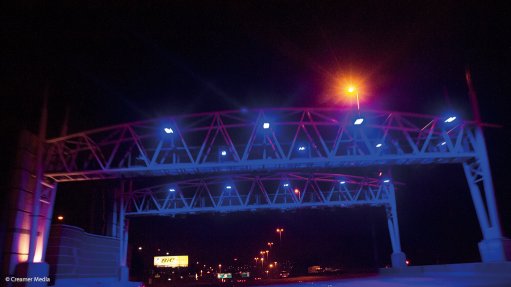
Photo by: Duane Daws
August 26, 2014.
For Creamer Media in Johannesburg, I'm Motshabi Hoaeane.
Making headlines:
Gauteng e-tolls consultations are expected to get under way.
Investment in Zimbabwe plunges as President Robert Mugabe seeks Chinese lifeline.
And, East African States to cooperate to close borders to criminals.
The advisory panel set up by provincial premier David Makhura that is looking into the socioeconomic impact of e-tolls in Gauteng is expected to start a month-long consultation process with organisations and individuals on Wednesday.
Through the hearings, to be held at the Gautrain offices, in Midrand, the panel would seek views on the economic, social and environmental impacts of the Gauteng Freeway Improvement Project (or GFIP) and e-tolls.
In considering the direct and indirect costs and benefits, the panel would look at the implications and perceptions of financing the GFIP from the fiscus, taking into account other demands on the fiscus.
The consultations would kick off on August 27, when labour was expected to give its input. Businesses would make submissions on August 28 and 29, civil society on September 1 to 3, information and knowledge institutions on September 4 and transport organisations on September 8 and 9.
Foreign investment into Zimbabwe plunged 59% to $67-million in the first half of this year, the central bank said on Monday, reflecting worries over President Robert Mugabe's policies and the risk of investing in that country.
Mugabe, at 90, is Africa's oldest leader and one of its longest-serving. He is visiting China this week and officials say he will seek funds to rebuild decaying roads, rail and power facilities and to help mechanise Zimbabwe's agriculture.
Announcing the drop in foreign direct investment, Reserve Bank of Zimbabwe governor John Mangudya said exports, mostly minerals and tobacco, were also down 13% in the first half of the year, to $1.3-billion, compared with the first six months of 2013.
Zimbabwe's economy is experiencing a serious dollar crunch and electricity shortages. Several companies have failed to pay salaries or have closed altogether, in a country where only 500 000 out of a total 13-million people hold formal jobs.
East African countries need to work together on tightening porous borders to help halt the movement of militants, drug traffickers and other criminals, the region's senior intelligence officers were told on Monday.
The call for such effort comes as several East African nations have been battling a rise in attacks often linked to the Somali Islamist group al Shabaab, which has promised to target African nations – mostly from the region – that have sent peacekeeping troops to troubled Somalia.
The week-long meeting of officers from 13 regional countries opened on Monday in Mombasa, the Kenyan port city that has been a regular target for attacks by militants.
Francis Rwego, head of Interpol regional bureau for East Africa, said the region needed to make sure it had a legal framework for cooperation and also needed to keep ahead of criminals using technology to carry out their activities.
“Criminals are getting well connected through modern technology and are becoming more sophisticated in their operations,” he said.
Also on Polity:
Recommended readings include the Schedule of Parliament of August 25, 2014, as well as a report commissioned by the Centre for Child Law titled ‘Promoting effective enforcement of the prohibition against corporal punishment in South African schools’.
Give your opinion on the EFF’s recent protest against President Jacob Zuma’s response in Parliament to the Public Protector’s report on his Nkandla homestead by voting on this week’s Polity’s poll.
And, don’t forget to follow us on twitter @PolityZA
That’s a roundup of news making headlines today.